Contemporary Issues in Art Education
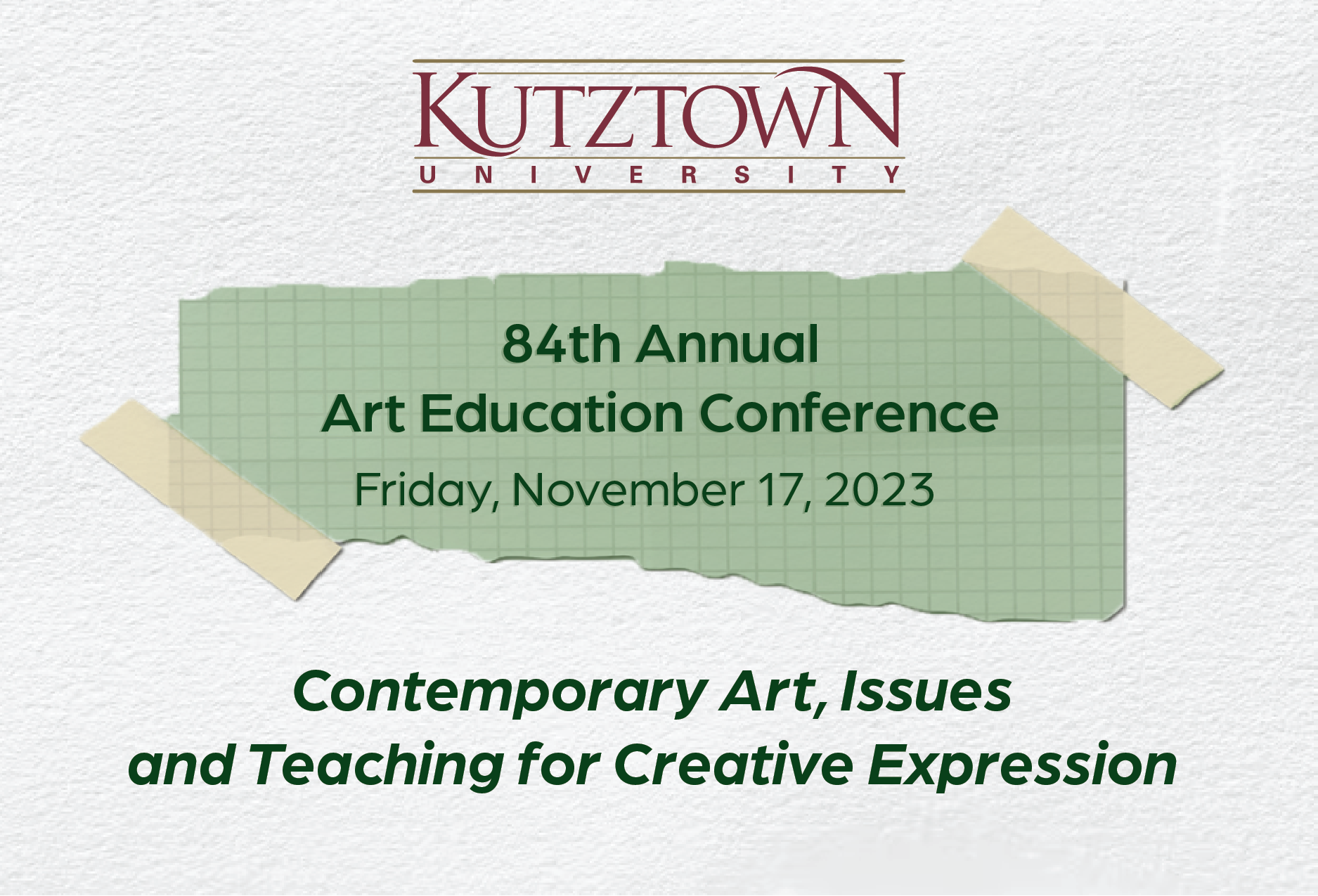
The 84th Annual Art Education Conference will focus on contemporary issues in art education by offering a range of perspectives and approaches to creative expression in response to art, society and culture.
What are contemporary issues in art education? How do artists address contemporary social issues through artmaking, and how can art teachers address contemporary issues relevant to students in the PK-12 art curriculum?
Mark your calendars and plan to join us on Friday, Nov. 17, 2023 for an exciting day filled with studio workshops, visual presentations, and creative ideas to explore contemporary issues and art.
Registration fee $80 if received before November 3rd
Late registration fee $100 must be received before November 10th
Registrations will not be accepted after November 10th
Keynote Speakers:
Flávia Bastos

Can Art Education Promote Civic Engagement? The Experience of Who is American Today?
Reflecting upon the continuous assaults to democracy and its institutions experienced recently, this presentation invites reflection and dialogue about:
- What is our responsibility as art educators to sustain democracy through meaningful engagement and critical activity?
- How can artists and creative citizens model an ethics of care that promotes desire to contribute to society?
Findings from the ongoing research project Who is American Today? will ground ideas, concepts, and pedagogical approaches that promote students’ agency and civic engagement. Connecting personal and political spheres, the project highlights the potential role of digital media and digital making in contemporary art education practices and invites art educators to actively engage with their students in the advancement of the common good.
-
About Flávia Bastos
Flávia Bastos, Ph.D. is a University of Cincinnati Distinguished Research Professor in the Arts and Humanities. Her research is inspired by the educational philosophy of educator Paulo Freire. Flávia is a Distinguished Fellow of the National Art Education Association, past chairperson for the Council of Policy Studies in Art Education, and former Director of the Higher Education Division of the National Art Education Association. Her current project Who is American Today? received the Excellence in Research in Education through Art, International Society for Education through Art in 2021. She received the 2009 Ziegfeld Award of the International Society for Education through Art (InSEA) and the Mary J. House Award of the National Art Education Association Women’s Caucus in 2007. She is past senior editor of the Journal of Art Education and has published and lectured extensively in the United States and abroad.
At UC Professor Bastos has directed the Graduate Program in Art Education for many years, helped establish the Latino Faculty Association, and served as Executive Director of the Emeriti Association. She joins the Graduate College leadership team in the role of Interim Associate Dean.
www.flaviabastos.com
JORGE LUCERO
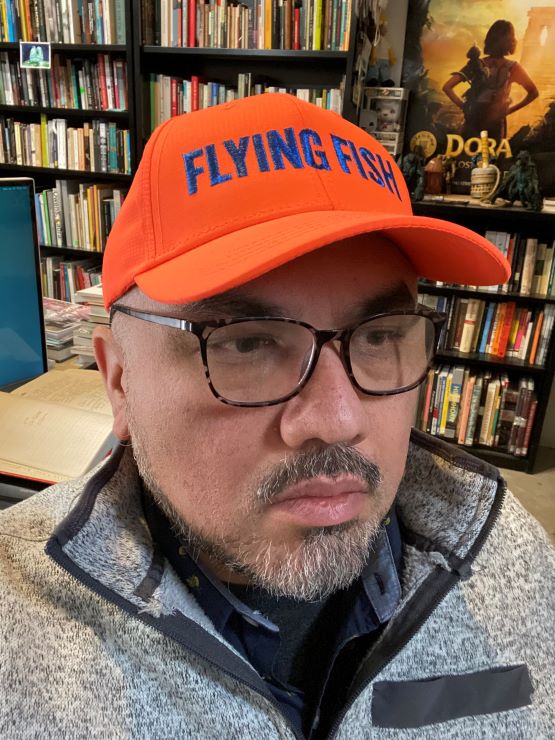
Learn about Conceptual Art & Teaching, an ongoing project that is simultaneously a hub, archive, and artwork at the increasingly active intersection where conceptual art and teaching practices meet. Stemming from the art and scholarship of artist and professor Jorge Lucero, CA&T tests the pliability of teaching as a conceptual art practice and the emergence of the teacher as a conceptual artist.
-
About Dr. Lucero
Artist Jorge Lucero is an Associate Professor of Art Education in the School of Art + Design at the University of Illinois Urbana-Champaign. He sometimes serves as the Program Chair for Art Education at UIUC. Lucero studied at the Pennsylvania State University and at the School of the Art Institute of Chicago. Prior to being at the University of Illinois, he happily taught art and art history at the Chicago Public School Northside College Prep. Jorge Lucero has performed, published, lectured, exhibited, and taught widely in the States and abroad.
In 2023, Dr. Lucero was named the National Art Education Association's (NAEA) Higher Ed Educator of the Year.
Stacy Levy

"Nature is my Client"
Stacy Levy collaborates with forces such as wind and tides and rain to register changes in our natural environment.
She has been making working artworks to help solve site issues such as storm water runoff and non point source pollution. Her lecture will explore her collaborations with urban nature, and projects that meld art, engineering and ecology.
-
About Stacy Levy (LEAVE-vee)
Stacy’s work with rain, urban tides, and aquatic food webs gives new understanding to the life of water on sites ranging from nature centers to parking lots. Some of her works highlight the unseen life forms inhabiting local water, while other projects create a home for the rain on the site. From puddles to watersheds. Stacy's work builds the bridge between art and science, as she collaborates with experts in many fields ranging from engineering to zoology.
Stacy has worked with urban tides in the East River and the Hudson, as well as the Schuylkill River in Philadelphia. She is currently working on a project in the new East Midtown Greenway in New York City to magnify the forms of common diatoms living in the East River.
A graduate of Yale University, Stacy also received her MFA from Tyler School of Art at Temple University and attended the Architectural Association in London. She began her work as an urban forester in the Mid Atlantic region and has been working as an eco-revelatory artist in the public realm for 29 years. Stacy has been awarded the Henry Meigs Environmental Leadership Award and the Penn Future Award for Women in Conservation.
Mary Enoch Elizabeth Baxter
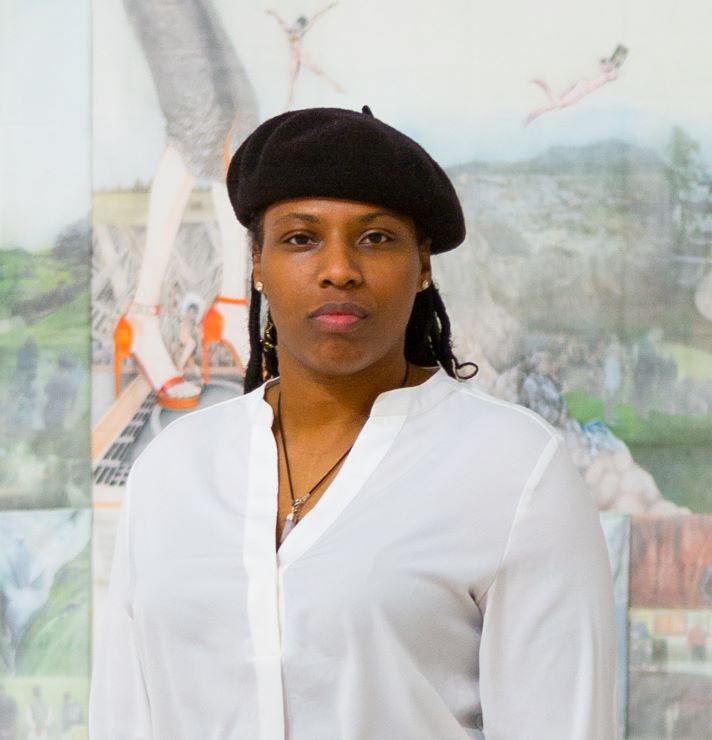
"Ain’t I A Woman?"
Ain’t I a Woman examines the history of reproductive injustice in the United States from an activist point of view. In work that explores the institutional, legal, and cultural processes that have long stripped Black women and girls of their bodily autonomy, Baxter centers storytelling and healing to reclaim agency and reframe the conversation about abortion access. She thus addresses the failings of this discourse, which has historically been driven by white and middle-class political movements, including first and second-wave feminism.
-
About Mary Enoch Elizabeth Baxter
Mary Enoch Elizabeth Baxter is an award-winning Brooklyn based multidisciplinary artist, activist and educator who creates socially conscious music, film, and visual art through an autobiographical lens. Although it has been a decade since her release from a Pennsylvania prison, Mary’s time spent on the inside continues to shape the direction of her art and practice. Her entertaining but poignant works offer a critical perspective on the particular challenges women of color face when they become immersed in the criminal justice system.
Her work has been exhibited at venues including MoMA PS1, African American Museum of Philadelphia, Frieze LA, Eastern State Penitentiary, Ben & Jerry’s Factory in Waterbury Vermont, Martos Gallery, the National Underground Railroad Freedom Center in Cincinnati and Brown University fall 2022.
Ms. Baxter is a 2017 Right of Return Fellow, 2018- 2019 Mural Arts Philadelphia Reimagining Reentry Fellow, 2019 Leeway Foundation Transformation Awardee, 2021 Ed Trust Justice Fellow, 2021 SheaMoisture and GOOD MIRRORS Emerging Visionary grantee, 2021 Frieze Impact Prize award winner, 2022 S.O.U.R.C.E studio Corrina Mehiel Fellow, 2022 Art 4 Justice grantee partner and 2022 Pratt Forward Fellow.
Presenters:
Angela M. LaPorte
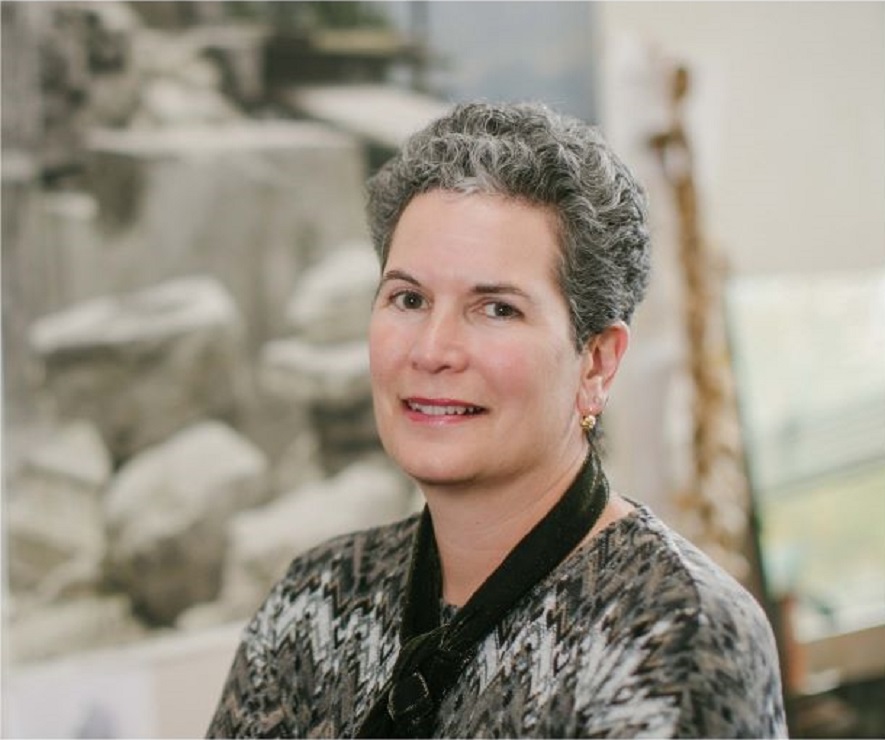
Inverse Inclusion as a Pedagogical Model to Preservice Teacher Education
Inverse inclusion will be introduced as a contemporary pedagogical model for preservice teacher education. The approach will be defined with implications for breaking down learning hierarchies and transforming teachers’ biased perceptions of students’ abilities and stereotypes. Curriculum examples and qualitative research will be shared from a service learning course with university students and adults with cognitive, developmental, and/or physical disabilities.
-
About Angela M. LaPorte, Ph.D.
Angela M. La Porte is the Director of Art Education at the University of Arkansas. She is Arkansas’ Equity, Diversity, and Inclusion Liaison and recently co-authored Art for Life’s Sake: The Case for Arts Education as a member of the American Academy of Arts and Sciences Commission on the Arts in Education. Angela is a National Art Education Association Distinguished Fellow and served as president of the United States Society for Education Through Art, chair of the National Art Education Association’s Lifelong Learning interest group, and Associate Editor for the International Journal of Lifelong Learning in Art Education. She edited the book, Community Connections: Intergenerational Links in Art Education, and has published numerous journal articles and book chapters. She is a Kenneth Marantz Fellow and recipient of the Pearl Greenberg and National Ziegfeld awards. Angela received the Arkansas Art Educator of the Year and Higher Education’s Art Educator of the Year. As an art educator of K-12 and across the lifespan, she is interested in further developing and studying an approach to service learning, inverse inclusion, to better understand how positive art education relationships across differences can begin to reduce stereotypes that emerge through the segregation of people and communities.
Cam McComb
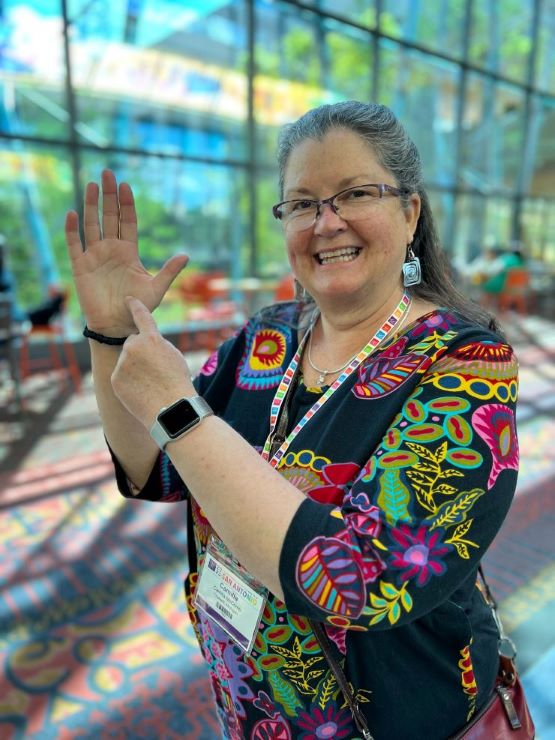
Communal Learning: Combining Structure with General Concepts to Promote Visual Expression
What if students could pursue avenues of personal interest while also helping others to learn and expand their thinking and art making abilities? Learn how adding key areas of structure to your lessons can develop student competence while unlocking the interpretive potential of their creative visual expression.
-
About Cam McComb
Dr. Cam McComb is Associate Professor of Visual Art Education at Eastern Michigan University where she co-leads the art teacher certification program. She holds degrees in Art Education from The Ohio State University, Miami University, and the Pennsylvania State University, where she earned a Doctor of Philosophy for researching pre-adolescents and their ability to document artistic thinking. Dr. Cam spent 25 years teaching art in K-12 public schools prior to beginning her work with preservice teachers. She is a National Board Certified Teacher, a mixed media artist, a published writer & scholar, an arts advocate, and a 2018 graduate of the National Art Education Association School for Art Leaders. She co-chairs the Higher Education Division of the Michigan Art Education Association with research interests focused on the scholarship of teaching and learning, assessment, and concept-based curriculum design. In 2023, Dr. Cam was the recipient of two awards granted by the National Art Education Association: Outstanding Educator for the Western Region Higher Education Division and the prestigious National Art Educator Award. Dr. Cam believes in the democratization of art making: a creative practice open to everyone at any time.
Liz Schneider & Adam DelMarcelle
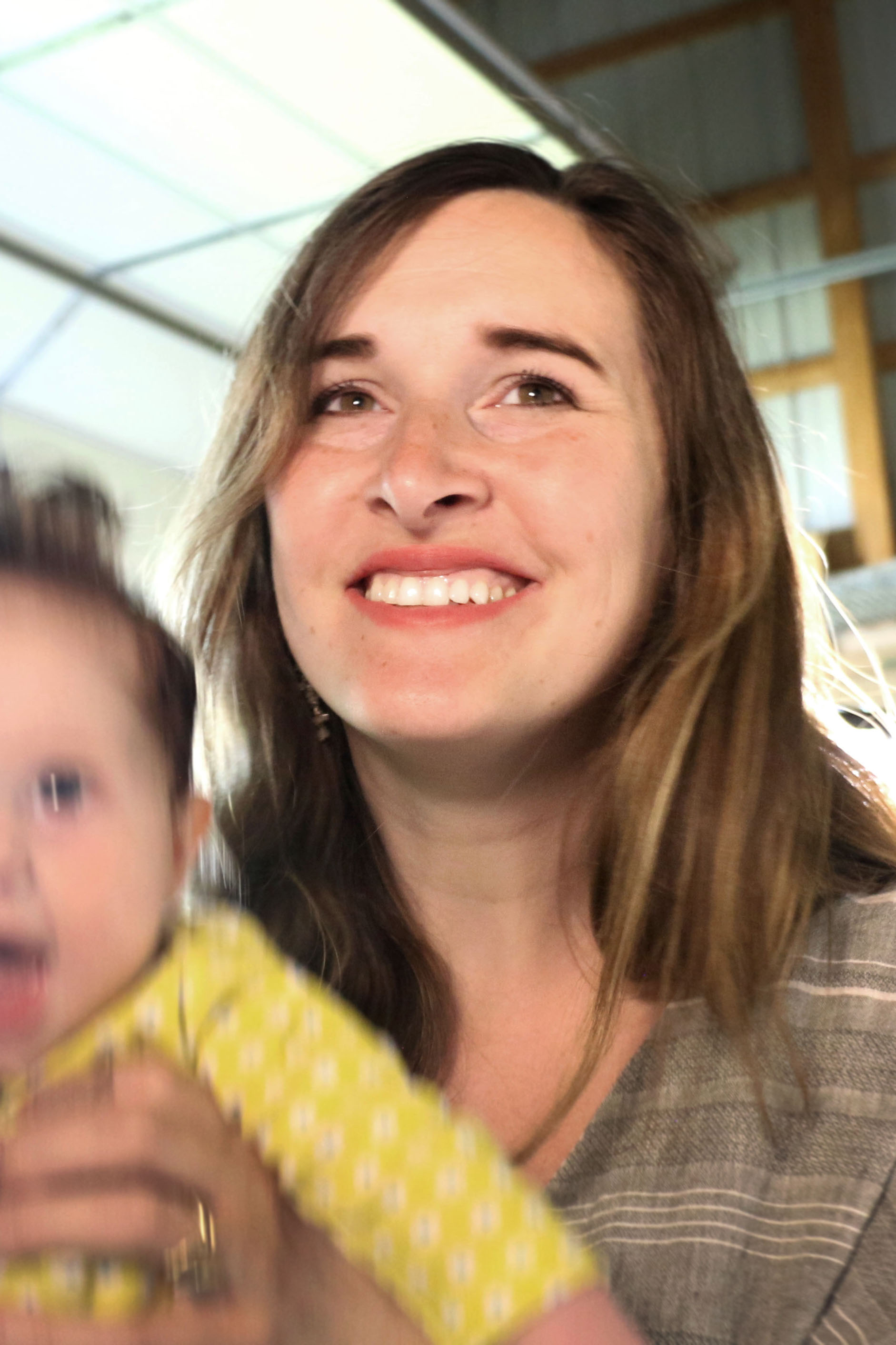
Professor Liz Schneider, Kutztown University
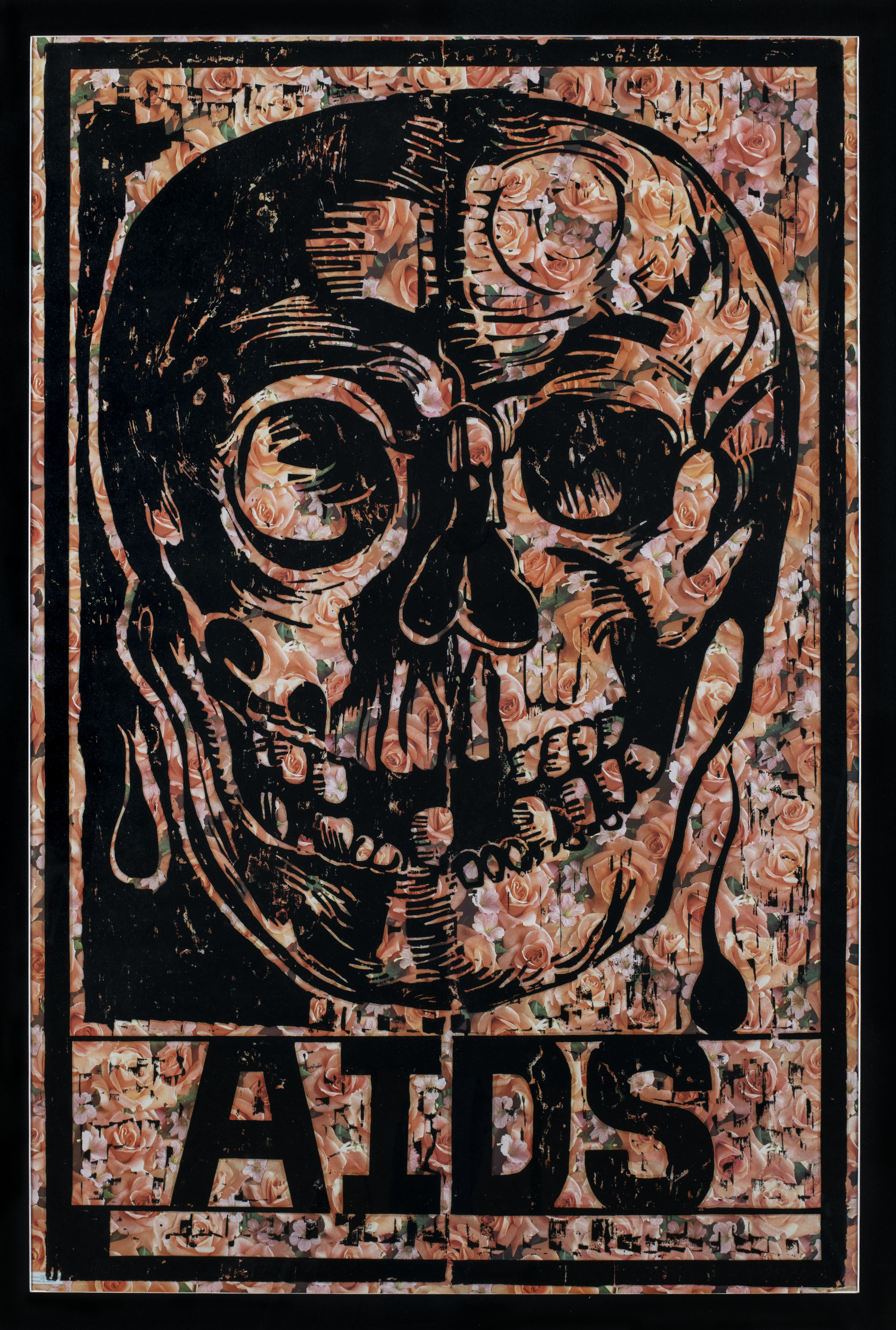
Aids 1984
Eric Avery 1990: Woodcut print on Mexican wrapping paper
Presented by the Animated Arts Program (organized by Professor Liz Schneider)
The collection is curated and cared for by Adam DelMarcelle, professor of Design at Wilson College in Chambersburg, PA.
The Call to Question Collection is a gathering of visual art, graphic design, photography, literature, performance, and music that explores the artist's role in society and their responsibility to humanity. The collection includes work by James Baldwin, Emory Douglas, Purvis Young, Jacob Lawrence, Leopoldo Mendez, Adrian Piper, Sue Coe, Eric Avery, Francisco Goya, Fitriani Dwi Kurniasih (Fitri DK), Matthew Clay-Robison, HN Werkman, John Heartfield, Brick x Brick Collective, Frans Masereel and others. This exhibition will also feature original artwork created by KU Animation and Creative Writing students. Artist activist, Sue Coe will visit KU for a lecture and workshop on Oct 26 and 27.
-
About Liz Schneider
Elizabeth Schneider received her BFA from Cornell University, with a focus on painting and printmaking, and she received her MFA from the University of South Florida, a transdisciplinary art program, focusing on painting and animation. Elizabeth Schneider is currently a Clements Research Fellow at University of Michigan. She is an internationally exhibiting contemporary artist, recently participating in exhibitions in Philadelphia, Asheville, and Virginia, including “Through These Eyes” at the Torpedo Factory Art Center. Her animations have been screened at film festivals around the world including the London Independent Film Festival, the San Francisco International Film Festival, the Buffalo International Film Festival, the Sydney Underground Film Festival, the New York Independent Cinema Awards (awarded Best Animation in 2021), and the Amsterdam International Short Film Festival (awarded Best Animation in 2021). Her latest collaborative animation with Michael Covello will be screened this August 2023 at the Portland Festival of Cinema, Animation, and Technology. Schneider has received numerous grants and awards, such as the Charles Baskerville Painting Award and an Opportunity Grant from the New York Foundation for the Arts. She has attended the 77Arts Residency, Wassaic Projects Family Residency, and the Hambidge Center for the Arts and Sciences Artist Residency. In 2023, she was awarded a fellowship for a Vermont Studio Center Residency and an Artist Residency at PLAYA. Schneider currently works as an Assistant Professor of Art at Kutztown University where she coordinates the Animated Arts program.
-
About Adam DelMarcelle
An artist, professor and designer, DelMarcelle focuses on using design activism to address larger societal issues, and his work has been receiving both local and national attention.
Since losing his brother to an opioid overdose and discovering countless more families torn apart by this issue, DelMarcelle has devoted his art to bringing awareness to this epidemic that is gripping his community of Lebanon, Pennsylvania, and many others nationwide. This exhibition brings together numerous mediums, including video and slide projections, audio recordings, and street art style prints, that inspire personal reflection and advocate the need for public dialog and action.
James Rees

James Rees
Fostering Critical Digital Citizenship: Empowering High School Students to Share Their Ideas about American Identity Through Digital Storytelling
For the past six years Dr Bastos and I have been working on the “Who is American today” project which Leverages the technological abilities of today's students who have been raised with digital technology and tools. This participatory arts-based project asks high school students to use digital storytelling to express their lived experiences in America today.
During this presentation I will share the step by step process and ways you can guide students in:
- Mastering the language of creative expression through digital media making.
- Attune participants to the unique perspectives of others by hearing their voices.
- Foster dialogue that connects lives and experiences throughout the project's process.
- Embracing the powerful potential for eventual transformation and openness to change.
-
About James Rees
A widely-known champion of the arts, James Rees is a passionate advocate for art education that balances theory, research, and practice. With more than 30 years of teaching experience, James he taught full-time at Provo High School for 30 years, and he has also taught undergraduate and graduate courses in art and art education at Brigham Young University, Utah Valley University, and Westminster College.
He currently serves on the NAEA Research Commission as Commissioner at Large. He has served on the National Art Education Association Board of Directors twice, as a Vice President and as the Secondary Division Director. He is a Fulbright Memorial Scholar, a Teachers Institute of Contemporary Art Fellow (SAIC), and an Art21 Fellow. James has served as reviewer for the President’s Committee on the Arts and the Humanities as well as the National Endowment for the Arts.
Marilyn stewart
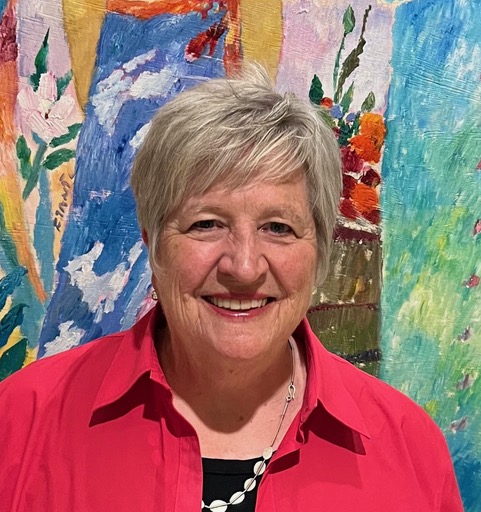
Investigating Messages and Lessons from Contemporary Art
With practices that include non-traditional, boundary-breaking approaches to artmaking, many artists working today provide us with insights for living in a sometimes challenging present-day world. What does their work require of us as we attempt to interpret and understand their messages? What are the take-aways for helping students explore meaning in much of contemporary art?
-
About Marilyn Stewart
Dr. Marilyn Stewart retired in May 2017 as Professor of Art Education and Co-coordinator of Graduate Programs in Art Education at Kutztown University of Pennsylvania where she taught courses in art education theory and practice and others such as “Visual Culture: Critical Practice,” “Women in the Arts,” and “Art Criticism,” and was the 2016 recipient of the Arthur and Isabel Wiesenberger Faculty Award for Excellence in Teaching. Dr. Stewart is author of the recently completed Davis Publications middle school textbook program, Experience Art. She is also author of Explorations in Art grades 1-6. Prior to these publications, she and Eldon Katter co-authored the first edition of the elementary series and two editions of the middle school series, Art and the Human Experience. Marilyn is co-author of Rethinking Curriculum in Art, author of Thinking Through Aesthetics, and Editor of the Art Education in Practice series, all published by Davis Publications. A frequent keynote speaker at meetings and conferences throughout the nation and abroad, Marilyn has initiated or has been consultant to numerous national and local curriculum projects, most recently serving for eleven years as Director of The Dinner Party Curriculum Project, as Coordinator of the Educator Guides Project for the PBS series, Craft in America, now in its fifteenth year, and as a member of the 12-person Writing Team for the National Visual Arts Standards and the Model Cornerstone Assessments. She has conducted over 200 extended professional development institutes, seminars, or in-service days in over 35 states. A Distinguished Fellow of the National Art Education Association, Dr. Stewart has received recognition and numerous awards for her contributions and was named by the National Art Education Association as the 2011 National Art Educator of the Year.
Workshops:
-
Quilted Narratives - Liz Quay
Artists have used various forms of quilting as a means of expression and social commentary for many decades. In this hands-on workshop, participants will engage with contemporary and historic artists who have devoted their practice to creating narrative art quilts. Participants will learn several techniques to add illustrative design to their own pieces. All levels of experience are welcomed and encouraged to join.
Sharadin Studio 121
-
Wrecking and Rebuilding: Combating Student Apathy with Visual Journal Prompts - CJ MAtz
Student apathy is a growing concern among high school art educators. Many students need help finding value and buy-in for sketchbook assignments. This workshop examines a semester-long visual journal project, used in an intro-level high school art course, aimed at providing room for student agency and re-engaging students while teaching them to respond creatively to prompts. Workshop attendees will learn how to create a stab-bound visual journal with several altered pages that will serve as a catalyst for creative student responses.
Sharadin Studio 205
-
Taíno Spirituality in Art, Music, and Dance - Miguel Sague Jr. and Leslie C. Sotomayor II
Miguel Sague Jr. and Leslie C. Sotomayor II will co-facilitate a workshop that centers the historical, spiritual, and artistic presence of the Caribbean Taíno culture. This workshop will introduce an overview of who the Taíno people are and their contributions to the arts and spiritual knowledge. Participants are invited to learn and experience Taíno music, dance, and the arts.
Sharadin Studio 206
Who is Miguel Sague Jr.?
Born Miguel A. Sague-Machiran in Santiago, Cuba, the chief beike of the Caney Indian Spiritual Circle grew up steeped in the rich hybrid tradition of the rural guajiro culture of eastern Cuba. Within this tradition there still exists a vital vein of the ancient Taino lifeways.
In the United States Sague lived in the ancestral homeland of the Seneca nation of north-eastern New York state and Pennsylvania. Here he absorbed the power and mystery of the Iroquois Longhouse and was inspired by its earthy beauty.
After a series of extraordinary spiritual experiences detailed in his book “CANOA”* Sague went on to found the Caney Circle in 1982. The teachings of the Caney as they were laid out in the sacred text, THE BOOK OF SONGS* spread from his little circle in Pennsylvania to influence the spiritual thought and inspire the ceremonial practice of many as far away as Arizona, California, Puerto Rico, and New York City.
Presently Beike Miguel Sobaoko Koromo lives in Verona, Pennsylvania near Pittsburgh with wife of 30 years Leni Mais-Guarishe a Cuban-born Taina of mixed Boricua-Cuban heritage.
On February 2, 2004 Beike Bo Sobaoko Koromo was named as official beike of the Ciboney Tribe in South Florida. This tribal entity represents people of Cuban Arawak-Taino affiliation, and other Caribbean Native peoples living in the South Florida region.
*CANOA (copyright Miguel A. Sague Jr. 2000)
*BOOK OF SONGS (copyright Miguel A.Sague Jr. 1979)Canoa is available for purchase on Amazon.com at this link.
Who is Leslie C. Sotomayor II?
Leslie C. Sotomayor II is an artist, curator, writer, and educator. As a first-generation bilingual scholar, she holds dual Ph.Ds. in Art Education and Women’s, Gender, & Sexuality Studies from The Pennsylvania State University. Sotomayor focuses on Gloria Anzaldúa's theory of conocimiento and autohistoria-teoría, a feminist writing practice of theorizing one's experiences as transformative acts to guide her teaching methodology and curate curriculum for empowerment. She has curated numerous art exhibitions Hide and Seek: Neighborhood Maker Space : Let’s Pretend: Borrandofronteras/Erasingborders and Hilos Rojos. Sotomayor’s publications include her books Teaching In/Between: Curating Educational Spaces with Autohistoria-teoría and Conocimiento (Vernon, 2022) and BIPOC Alliances: Building Communities and Curricula (IAP, 2023), and articles/chapters: Testimonio in a Sculpture Series of Muñecas : Needlework: Forging Spaces for Making Through Conversation : Talking about Belonging and Survival and Teaching In/Between: Curating Educational Spaces with Autohistoria-teoría and Conocimiento. Her scholarship, research, and curating embrace creative culturally responsive critical reflections for healing and transformations. Currently, Sotomayor is an assistant professor in Art Education and a Frederick Douglas Institute Scholar at Kutztown University. She may be contacted at: lcz5008@gmail.com.
-
Metal Casting - Janna Gregonis
Create shallow bas relief and small cast objects using pewter and sand casting. This quick workshop will allow participants to try simple mold making techniques to create a negative space and cast metal positive forms. We will be using pewter and sand during the workshop, but alternatives for a classroom will be discussed. All materials used are reusable, recyclable and accessible.
Sharadin 106 - The IDEA Studio 3D Space
-
Typography, What's the Message? - Elaine Cunfer and Vicki Meloney
Kutztown University Communication Design Professors, Vicki Meloney and Elaine Cunfer facilitate a workshop encouraging participants to express themselves through the artistic and creative use of typography and low-cost printmaking techniques. Participants will create a personalized typographic poster using a variety of DIY image-making methods to assemble words into an artistic statement using methods that can be easily translated to the classroom.
Sharadin 103 - The IDEA Studio 2D Space
-
Expressing Individuality through Materiality - Jayne Struble
Demonstrated throughout history, figure drawing has the potential of capturing subtle and unique reflections of both the artist's and subject's identity. For this workshop, we will focus on mixed media and experimental drawing grounds to explore ways to capture gestural and sustained expressions of the body. Seeking the flow state of drawing observationally, we will be working with two in-person nude models throughout the workshop. This time is meant to foster your creativity, refresh on proportions and find inspiration from the atmosphere and materials.
Sharadin 124 - Life Drawing Studio
-
Local Color: Cultivating Connection - Gwendolyn Yoppolo
Discover the power of making your own art media using cultivated and foraged plants from your local ecosystem. In this workshop, you will learn about responsible foraging and growing dye plants using organic, regenerative gardening strategies. We will process plant matter into dyes for use with fabrics, yarns, and fibers. While our fibers are simmering, we will turn some of our plant-based dyes into inks and turn others into pigments for use in paints and drawing sticks. Participants will emerge with swatches of colors, trays of paints, crayons and pastels, and a renewed sense of connection and stewardship for the plants growing around them.
Sharadin 107 - Ceramics Stuido
RoundTable sessions:
PK - 12 art teachers share lessons on contemporary art and issues.
Each presenter will have 20 minutes to share an interactive lesson allowing the attendees to learn from teachers at elementary, middle and high school grade levels.
Participants will be able to attend two sessions in a 60 minute period, allowing time for questions and discussion.
-
Jaime Linn Brown - Centerville Middle School, Hempfield School District (Lancaster, PA)
Lesson Plan:
You can teach an old dog new tricks! This presentation will walk participants through the process of how one veteran educator of twenty-one years reimagined her curriculum and classroom environment. The art classroom is rebranded as a studio and the child is the artist (Douglas & Jaquith, 2006). In this presentation I highlight a lesson where students have complete autonomy over what they are learning and how they are learning it in a sustained investigation – or “choose your own adventure.” A sustained investigation is an Inquiry based and in-depth study of materials, processes and ideas over time. This lesson capitalizes on the power of personal experience, cross curricular connections, and the structure of the proposal process with middle school students in a classroom. Contemporary and current issues that are personal and meaningful to each individual student have become more frequent since this curricular change. It has allowed me to assist them in navigating these topics in new ways that are responsive to their own lived stories. This classroom embraces both key concepts of Studio Habits of Mind and Teaching For Artistic Behavior.
Who is Jaime Linn Brown?
Jaime Linn Brown, EdD is an artist educator from Shoemakersville, PA, with 21 years of field experience. She taught abroad in Sano, Japan in 2010-2011. Her experience in the Japanese education system has provided her with an alternate lens to analyze practices in American education. Jaime earned a BS in Art Education from Kutztown University (2002), a MEd in Art Education from Millersville University (2008), and EdD in Transformational Teaching and Learning from Kutztown University (2020). She is recognized as a Carnegie Project on the Education Doctorate (CPED) featured graduate and Alpha Epsilon Lambda National Honor Society member. Jaime’s research, Socially Just Artmaking: A Practitioner’s Inquiry of Passionate Teaching for Compassionate Action, empowers students to challenge majoritarian stories as they draw upon their own lived experience through self-directed, meaningful artmaking towards art activism. She currently teaches seventh and eighth grade art at Centerville Middle School, in the Hempfield School District (Lancaster, PA). Jaime also serves on the Muhlenberg College faculty as an Adjunct Professor of Education.
-
Michael Bricker - Central Dauphin High School, Central Dauphin School District (Harrisburg, PA)
This Is Me: The Process of Becoming and the Importance of Our Stories
While we reside in a product-focused field, there is much empowerment and profundity to be discovered in the process of creation and connection. Reading, writing, sketching, collaborating, critiquing, self-reflection and dialogue provide opportunities for our students to find their most genuine selves, as well as appreciate and embrace those around them.
I have a strong belief that a lot of what is lacking in not just the education world but also society in general is a sense of compassion based in the lending of voices, eyes, and ears in a collaborative and compassionate manner. I feel this is especially true because of the emergence of Covid and virtual learning. We all have stories, and we want our stories to be heard. Then others can understand us better….and in turn….we can understand others better.
I am (and have been) attempting to develop a personal and process-focused curriculum that will allow students to investigate, explore, and mine their own lives, as well as their surroundings, in an attempt to create a profound autobiographical experience that also results in truly appreciating others’ experiences as well. The goals of this session are as follows: participants will consider their current pedagogical practices and then attempt to create multi-faceted units of study that will empower students to find their true selves, detail powerful narratives, and enable each to express themselves and expand upon their definition of who each is, what each does, and what a (global) art room could look like.
This presentation will encourage educator and student self-reflection, particularly in the realm of classroom environment and instructional strategies, and then work together within their space to bring about a positive and meaningful change. This “community” may begin within their own art rooms, but ultimately spread to other courses, classrooms, and the school at-large in a movement to create a foundational growth mindset built on empowerment and empathy.
Who is Michael Bricker?
Michael Bricker received his Bachelor’s Degree in Art Education from the Pennsylvania State University, his M.Ed. in Educational Strategies and Development from Wilkes University and is pursuing a PhD in Art Education (though that is on pause), with deep interests in Social Justice and Athletics, as well as Social-Emotional Learning. He has taught in public schools, in all grades (K-12), in three different school districts over the past 24 years. In addition, he has written curriculum for the last fifteen years and served as the Secondary Art Department Chairperson for the Central Dauphin School District for the past six years. His words and artistic works have been published in Life Images Quarterly and was included in the collective volume 1000 Artist Journal Pages: Personal Pages and Inspirations. His most recent publication is Defamiliarizing a Walk, in conjunction with Dr. Illayda Altuntas, under the direction of Dr. Kimberly Powell, in the International Review of Qualitative Research. Michael’s mixed media works, which often offer commentary on popular culture mores, assigned identities, and the divided nature of both contemporary and historical times (socially, culturally, and politically), have also been featured in various museums throughout the region. A regular presenter at PAEA conferences, Michael also finds a passion in collaborating with and training fellow art and classroom educators. His greatest influence, especially in these times, are his two children, Aria and Mateo.
With a classroom approach that highlights the crucial importance of the creation of safe, open and empowering environments and a pedagogical practice that emphasizes reflection and growth in conjunction with the appreciation and celebration of multiple philosophical perspectives, Michael is both humbled and excited for the opportunity to collaborate with colleagues at the 84th Annual Art Education Conference at Kutztown University.
-
Lindsay Hentzel Esola - Flowering Fox Art Studio (Penn Argyl, PA)
Lesson Plan:
Overcoming the creative slump. How to teach and write lesson plans that adhere to both National and State Standards, yet still allow for artistic freedom. There are strong arguments that drop offs or slumps in the development of artistic and creative growth can be offset by thoughtful and timely educational interventions that are teacher-led and student-centered. These “interventions” can be written into existing lesson plans to include more personal choice options, scaffolding methods and experiential learning techniques. This presentation will demonstrate a unit plan for elementary students (that can be easily adapted for high school) that shows the change in student engagement and artistic development after an “intervention” was completed.
Who is Lindsay Hentzel Esola?
Lindsay is a 2022 graduate of Penn State university with a PhD in Art Education and a minor in Psychology. Her interest and research lies in enhancing creative thinking, self-efficacy and artistic growth through Constructivist teaching methodology. She works at an intersection of Education, Neuroscience and Psychology. Her PhD research was a comprehensive systematic review on creative thinking which featured quantitative research methods and data visualization techniques not commonly utilized in educational settings.
She has over 15 years teaching experience in K-12 and college classrooms. She currently owns her own Art Studio, Flowering Fox, in Pen Argyl PA and is accredited by the Department of Education to administer Professional Development (ACT 48 credits) in Visual Arts.
-
Alison Binger - Susquenita Elementary Schhol, Susquenita School District (Duncannon, PA)
Lesson Plan:
Artfusion: Building the Mini MET in your classroom
The Mini MET is a project-based lesson that aims to engage students in an immersive artistic experience while fostering collaboration, cultural awareness, and appreciation for diverse art genres. This presentation guides you through the process of transforming a classroom into a virtual art gallery inspired by the Metropolitan Museum of Art. Students from various classes select and curate artwork from six different genres: Contemporary America, Arts of Africa, Asian Arts, European Paintings, Islamic Art, and Photography. The benefits of this lesson include cultural appreciation, artistic growth, critical thinking, and personal connections. This project-based lesson reinvigorates the educational experience by incorporating art, culture, collaboration, and personal exploration. It aims to instill a lifelong appreciation for the arts and a deeper understanding of the world’s rich cultural tapestry.
Who is Alison Binger?
Dr. Alison Binger earned a Ph.D. in Global and Comparative studies in Education, a M.Ed. in Art Education with a cultural focus, and a B.S. in Art Education with a cultural arts focus. My mission is to ensure equity in education though the rise of cultural awareness. My research explores four areas: educational systems, foreign language, cultural immersions, and cultural arts. Through understanding culture and acceptance of differences, we can learn to work together as a community to create a sustainable, progressive, and beautiful world for all of us to grow.
I am a visual arts educator in a public K-12 educational system in the state of Pennsylvania, USA. I am also a professor in a Masters of Education program at the 1st free online university, University of the People, which provides access to education to all students in the United States and around the world. I support the visual and performing arts and Humanities in education as well as support the United Nations fourth goal of quality education for all students and particularly focus on the 4.5 goal of ensuring equal access of education for girls and women around the world. I was a Peace Corps volunteer from 2002-2004 on the island of Dominica in the West Indies and worked with the Ministry of Education.
-
Renee Williams-Erwin - Elementary school and owner of Original Perspective, LLC (North Wales, PA)
Lesson Plan:
Creating the illusion of a 3-D space on a 2-D surface! Wow! This lesson presentation is for elementary-level teachers. Students learn how the presented historical and contemporary artists have used the one-point perspective technique to create the illusion of depth and space in their artworks. Students explore the steps of this well-scaffolded lesson to create their own unique 3-D space on a 2-D surface. Practicing this technique will enable students to appreciate historical and contemporary artists who utilize the one-point perspective technique in their artwork. This lesson introduces students to their artist toolkit–the elements and principles of art and design. Visual Thinking Strategies (VTS) are a vital component of this lesson. Throughout this lesson, the teacher is the facilitator, encouraging students to observe and reflect on their artworks and the work of historical and contemporary artists to gain deeper meaning. This lesson aligns the SHoM framework with the applicable PA Visual Arts Standards and NCVAS
Who is Renee Williams-Erwin?
Renee Williams-Erwin has been creating art for over 30 years! Working in a variety of genres, themes & markets has given me a rich base of application experience. Some markets I have enjoyed working in include: editorial, advertising, corporate, teacher resources, novelty, & interior mural works.
Graduating from Tyler School of Art-Temple University in 1991 with distinction, I earned a BFA in Graphic Design with an emphasis on Illustration.
Along the way I have been fortunate to receive several awards including: Colored pencil finalist in Artist’s Magazine, work featured in Print’s Regional Design Annual & my stationery was accepted in Print’s Best Business Cards & Letterheads-4.
I have been a teaching artist since 1991 and recently earned PA teacher certification in 2023 at Kutztown University. In 2017, I established Original Perspective, LLC, which is a multi-media art program open to students in grades 2-6.
-
Thomas Dareneau - Boyertown Area Senior High School, Boyertown Area School District (Boyertown, PA)
Who is Thomas Dareneau?
Thomas Dareneau is the department head of the Boyertown Area Senior High Art Department. Over the last 24 years he has taught drawing, painting, computer graphics, animation, art history and AP Art Studio. Currently he is serving on the board of Berk Arts. In 2015, Mr. Dareneau was accepted into the Art21 Educators program and has been working with them ever since. He has been published through Art21 and Scholastic Arts Magazine. He lives in Reading, Pennsylvania with his wife and daughter, while his son is attending Penn State in State College. Currently he is most proud of his son’s acceptance into the Schreyer Honors College at University Park and being the “Craft Dad” of his daughter’s Girls Scout Troop.
Keynote panel discussion:
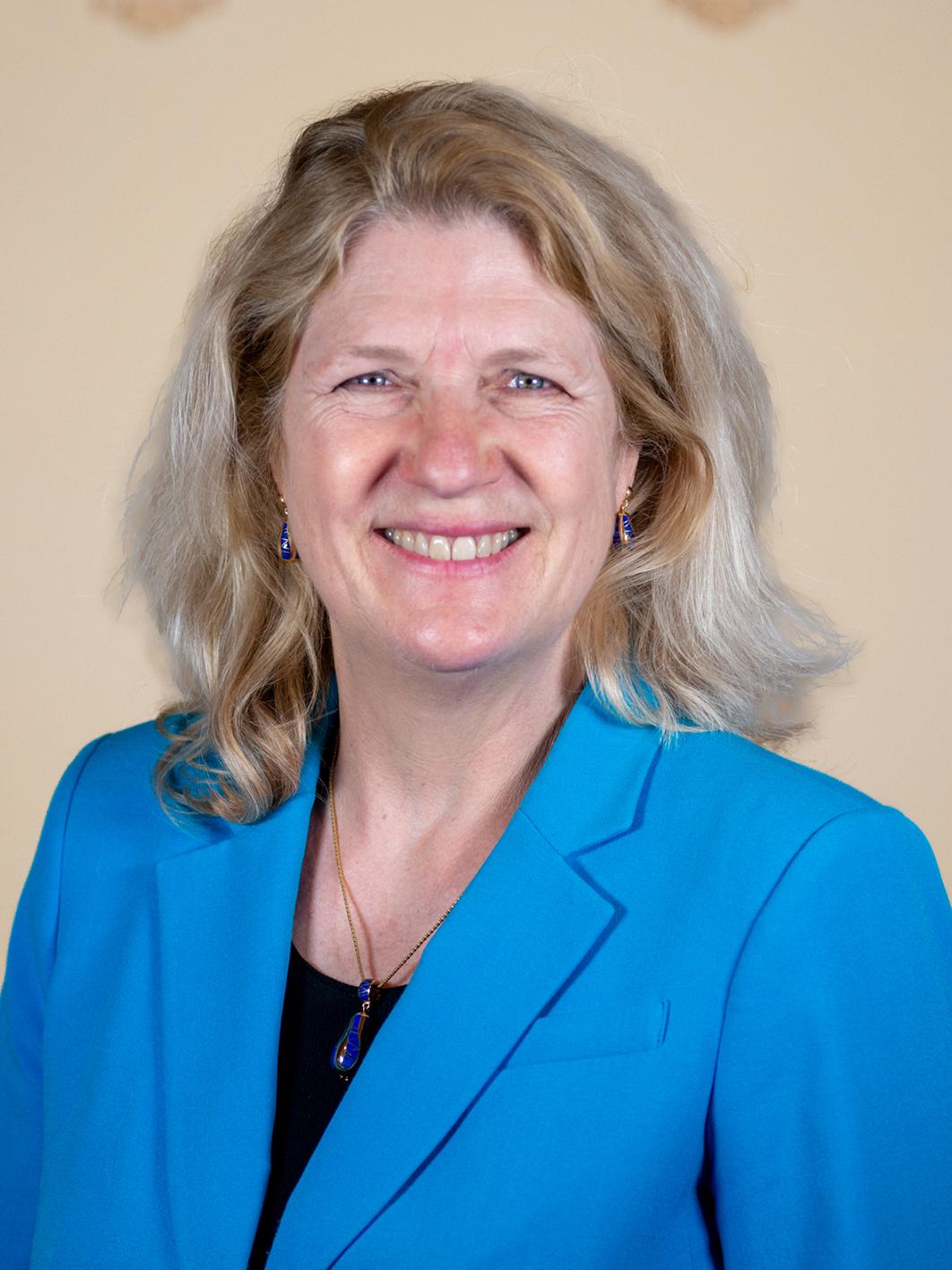
Yvonne Gaudelius
Yvonne Gaudelius will moderate a panel discussion with our esteemed keynote speakers to question and reframe our understandings of contemporary issues and how they can be explored and expressed in the art room.
Who is Yvonne Gaudelius?
Dr. Yvonne Gaudelius has worked at Pennsylvania State University for 30 years, serving as associate dean for undergraduate studies and outreach through the College of Arts and Architecture from 2003 to 2006, interim dean for the college from 2006 to 2007 and associate vice president and senior associate dean of Undergraduate Education from 2007 to 2020, before she transitioned to interim vice president and dean in 2020. As of this past June, Dr. Gaudelius returned to the School of Visual Arts faculty as a Professor of Art Education and Women’s, Gender and Sexuality Studies. Dr. Gaudelius is a well-published researcher in subjects pertaining to pedagogy, women’s studies and the fine arts.






